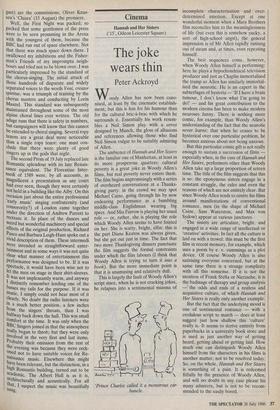Cinema
Hannah and Her Sisters (`15', Odeon Leicester Square)
The joke wears thin
Peter Ackroyd
Woody Allen has now been cano- nised, at least by the cinematic establish- ment; but this is less for his humour than for the cultural bric-à-brac with which he surrounds it. Essentially his work resem- bles a Neil Simon play with a cover designed by Munch, the gloss of allusions and references allowing those who find Neil Simon vulgar to be suitably admiring of Allen.
The ambience of Hannah and Her Sisters is the familiar one of Manhattan, at least in its more prosperous quarters: cultural poverty is a great joke in Woody Allen's films, but real poverty never enters them. The film begins unpromisingly with a series of overheard conversations at a Thanks- giving party: in the crowd we may spot Michael Caine, going through his by now endearing performance as a bumbling middle-class Englishman wearing big specs. And Mi a Farrow is playing her usual role — or, rather, she is playing the role which Woody Allen seems to have foisted on her. She is scatty, bright, elfin: this is the part Diane Keaton was always given, but she got out just in time. The fact that two more Thanksgiving dinners punctuate the film suggests the formal constraints under which the film labours (I think that Woody Allen is trying to turn it into a book). But the more immediate point is that it is unamusing and relatively dull.
This is largely the fault of Woody Allen's script since, when he is not cracking jokes, he relapses into a sentimental miasma of 'Prince Charles called it a monstrous car- incomplete characterisation and over- determined emotion. Except at one wonderful moment when a Marx Brothers film reconciles him to the meaninglessness of life (but even this is somehow yucky, a sort of high-school angst), the general impression is of Mr Allen rapidly running out of steam and, at times, even repeating himself.
The best sequences come, however, when Woody Allen himself is performing: here he plays a hypochondriacal television producer and just as Chaplin immortalised the tramp so Allen has similarly immortal- ised the neurotic. He is an expert in the subterfuges of hysteria — 'If I have a brain tumour, I don't know what I'm going to dor — and his great contribution to the modern cinema has been to make modern neuroses funny. There is nothing more comic, for example, than Woody Allen's understanding of the fact that the neurotic never learns: that when he ceases to be hysterical over one particular problem, he becomes anxious about not being anxious.
But this particular comic gift is not really enough to sustain a succession of films especially when, in the case of Hannah and Her Sisters, performers other than Woody Allen take up a large proportion of screen time. The title of the film suggests that this is so: the eponymous sisters engage in a constant struggle, the rules and even the reasons of which are not entirely clear. But since Woody Allen tends to centre his films around manifestations of conventional romance, men (in the shape of Michael Caine, Sam Waterston, and Max von Sydow) appear at various junctures.
The sisters are articulate, bright, and engaged in a wide range of intellectual or `creative' activities. In fact all the culture is laid on with a trowel: this must be the first film in recent memory, for example, which uses a poem by e. e. cummings as a plot device. Of course Woody Allen is also satirising everyone concerned, but at the same time there is a strange complicity with all this nonsense. If it is not the mention of Frank Stella or Nietzsche, it is the badinage of therapy and group analysis -- the odds and ends of a restless and acquisitive culture, of which Hannah and Her Sisters is really only another example.
But the fact that the underlying mood is one of sentimental romance — with a credulous script to match — does at least suggest just how shallow this 'culture' really is. It seems to derive entirely from paperbacks in a university book store and is used as just another way of getting heard, getting ahead or getting laid. How much one can distinguish Woody Allen himself from the characters in his films is another matter, not to be resolved today. So, on the whole, Hannah and Her Sisters is something of a pain. It is redeemed fitfully by the presence of Woody Allen, and will no doubt in any case please his many admirers, but is not to be recom- mended to the easily bored.


















































 Previous page
Previous page